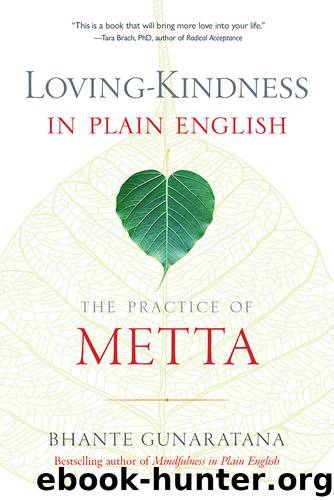Loving-Kindness in Plain English by Henepola Gunaratana

Author:Henepola Gunaratana
Language: eng
Format: epub
Publisher: Wisdom Publications
So you see, we practice mindfulness meditation and metta for all beings — this includes humans, non-humans, animals, gods, demons, ghosts, spirits, bipeds, quadrupeds, beings with hundreds of feet, thousands of feet, no feet, birds, and all beings in the water and air. We are part of a vast community with all beings, and the loving-friendliness we cultivate should extend to them as well.
In my own life, as a member of ordained communities, I have found that the entire monastic life depends on metta. The monastery is like a training ground for us to develop qualities like love and patience, and the community only functions well when each member practices metta. We are taught to be able to forgive any offense anybody commits against us. Loving-friendliness can help us avoid conflicts, especially due to misfortune and misunderstanding; it teaches us to be conciliatory and not proud or hostile. When one party feels hurt, friendliness can help establish peace and harmony. Monks and nuns should behave with patience and loving-friendliness in all physical, verbal, and mental actions — whether done in public or in private — toward our companions in monastic life. We should be very generous to share with our monastic community any knowledge and insight we have gained in our meditation practice. If a member of our community is lazy and does not participate in regular activities, we can advise him or her to do so without getting upset or angry. Our metta must be boundless — and our practice of patience must be boundless.
I have seen the benefit of this practice in my life — I have never regretted practicing metta and being patient. I never get tired of practicing metta and patience. Even if you do not live among monks and nuns (as most of you do not!), you will likely find that if you practice metta and patience with your companions you will not regret it either. Instead, you may be surprised to see that your kindness no longer becomes limited to those you interact with on a daily basis. Your metta can become limitless, and you may start to notice that you feel a warm heart for those who may have previously been outside your circle of care. The boundary that once limited who you feel a sense of friendliness toward gradually gets worn away, and any ill will you once harbored begins to disappear.
As we have seen, metta and mindfulness are often equated. Both have similar characteristics. As monks and nuns, in mindfulness practice we learn that we should cultivate clear comprehension while walking forward, going backward, looking away, wearing our robes, and carrying our alms bowl. Yet lay people can also train to live with such mindful awareness and clear comprehension in all their actions. We can develop our mindfulness while eating and drinking, while using the restroom, talking with others, observing silence, going to bed and rising in the morning, and while working and relaxing.
Similarly, we should practice metta in all these activities.
Download
This site does not store any files on its server. We only index and link to content provided by other sites. Please contact the content providers to delete copyright contents if any and email us, we'll remove relevant links or contents immediately.
The Way of Zen by Alan W. Watts(6600)
Ego Is the Enemy by Ryan Holiday(5413)
The Art of Happiness by The Dalai Lama(4125)
The Book of Joy by Dalai Lama(3976)
Why Buddhism is True by Robert Wright(3446)
Spark Joy by Marie Kondo(3298)
Shift into Freedom by Loch Kelly(3193)
Happiness by Matthieu Ricard(3040)
A Monk's Guide to a Clean House and Mind by Shoukei Matsumoto(2908)
The Lost Art of Good Conversation by Sakyong Mipham(2650)
The Meaning of the Library by unknow(2564)
The Unfettered Mind: Writings from a Zen Master to a Master Swordsman by Takuan Soho(2306)
The Third Eye by T. Lobsang Rampa(2257)
Anthology by T J(2206)
Red Shambhala by Andrei Znamenski(2193)
The Diamond Cutter by Geshe Michael Roach(2058)
Thoughts Without A Thinker: Psychotherapy from a Buddhist Perspective by Epstein Mark(2012)
Twilight of Idols and Anti-Christ by Friedrich Nietzsche(1892)
Advice Not Given by Mark Epstein(1878)
